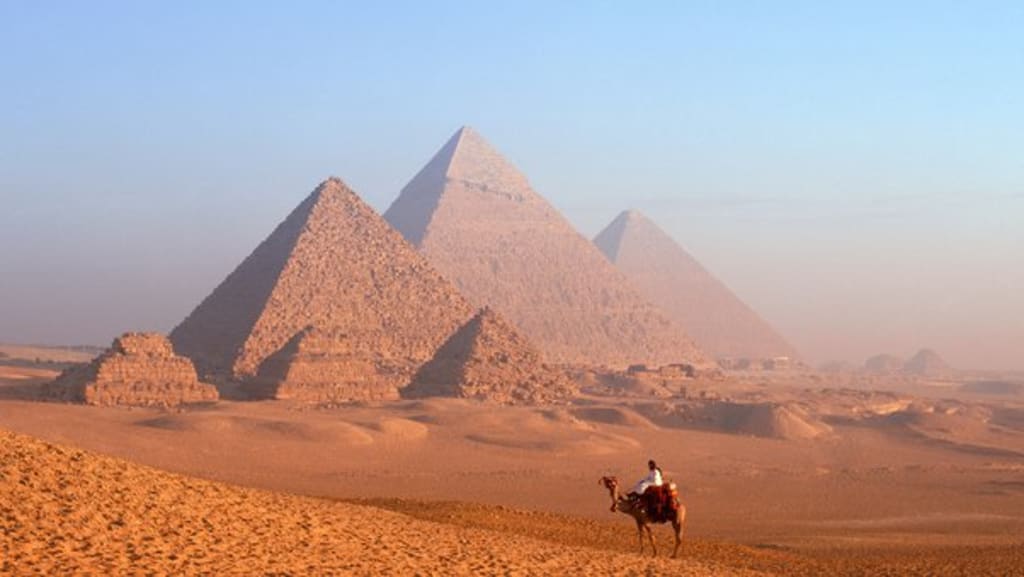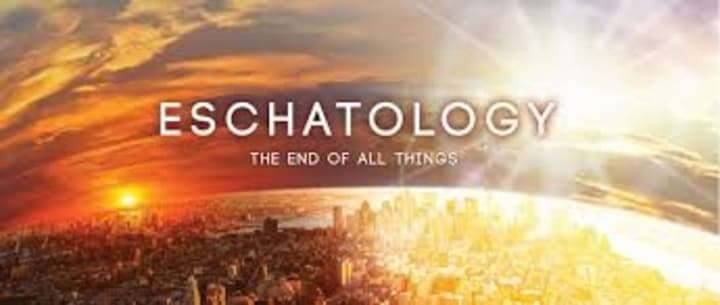ESCATHOLOGY
Exploring the Study of End Times and the Ultimate Destiny of Humanity

Preface
The study of eschatology, with its profound exploration of the end times and the ultimate destiny of humanity, has captivated the minds and hearts of individuals across cultures and throughout history. It is a subject that delves into the mysteries of existence, the nature of reality, and the purpose of our journey in this world. Eschatology offers glimpses into the grand narrative of human history, unveiling the possibilities and challenges that lie ahead.
In this comprehensive article, we embark on a remarkable journey through the vast terrain of eschatology. We delve into its origins, tracing its roots from ancient beliefs to the influences of various religious traditions. We examine the perspectives of Christianity, Islam, Judaism, Hinduism, and Buddhism, shedding light on their distinct eschatological frameworks. Moreover, we expand the horizons of eschatology beyond religious realms, exploring philosophical, scientific, environmental, sociopolitical, and technological interpretations.
Through the lens of contemporary debates, we delve into the diverse interpretations of eschatology, reflecting on theological differences, textual analysis, historical contexts, and critical inquiries. We also explore the profound impact of eschatology on popular culture, as it finds its expression in literature, film, music, art, and even video games.
The personal dimensions of eschatology cannot be overlooked, as we examine the existential implications it holds for individuals. We ponder the beliefs about death, afterlife, and the search for meaning and purpose in light of eschatological worldviews. Additionally, we explore the ethical considerations and psychological repercussions that arise from contemplating the end of times and the fate of humanity.
Finally, we consider the role of eschatology in fostering interfaith dialogue and understanding. We highlight common themes across religious traditions and explore the challenges and opportunities that arise in navigating eschatological perspectives in a diverse and pluralistic world.
As you delve into the depths of this article, let your curiosity guide you through the vast array of eschatological concepts, interpretations, and visions. Whether you approach this subject from a religious, philosophical, or purely academic standpoint, it is our hope that this article will provide you with a comprehensive and thought-provoking exploration of eschatology—a topic that has long fascinated humanity and continues to shape our understanding of the past, present, and future.
Let us embark on this intellectual odyssey together, as we journey into the realms of eschatology and explore the profound mysteries that lie at the heart of human existence.
WHAT DOES CHRISTIANITY STAND FOR IN ESCHATOLOGY?
In Christianity, eschatology holds a central place as it deals with the study of the end times, the return of Jesus Christ, the resurrection, and the ultimate destiny of humanity. Christian eschatology is based on the teachings found in the Bible's Old and New Testaments. This section provides an overview of the key concepts and beliefs within Christian eschatology.
Second Coming of Christ:
Central to Christian eschatology is the belief in the second coming of Jesus Christ. Christians anticipate that Jesus will return in glory and power to judge the living and the dead. His return is seen as the culmination of human history and the establishment of God's kingdom on Earth.
The resurrection of the Dead:
Christianity affirms the belief in the resurrection of the dead. It is believed that at the time of Jesus' second coming, the bodies of all believers will be resurrected and reunited with their souls, resulting in eternal life in the presence of God. This resurrection includes both the righteous and the wicked, but with different destinies.
Final Judgment:
Christian eschatology includes the concept of a final judgment, where all individuals will be held accountable for their actions. The judgment will determine the eternal destiny of each person based on their relationship with God and their response to Jesus' sacrifice.
Heaven and Hell:
Christianity teaches that after the final judgment, believers who have accepted Jesus Christ as their savior and lived a faithful life will enter into the joy and bliss of heaven. Heaven is seen as the eternal presence of God, a place of perfect communion and eternal life. On the other hand, those who have rejected God and lived in rebellion will face eternal separation from God in hell, a place of punishment and torment.
Millennium and the Rapture:
Within Christian eschatology, there are different interpretations regarding the timing and sequence of end-time events. Some Christians believe in a literal or figurative "millennium," a thousand-year period of peace and righteousness on Earth, which occurs before the final judgment. Others hold to the belief in the "rapture," where believers will be taken up to be with Jesus before a period of tribulation on Earth.
Antichrist and Tribulation:
Christian eschatology often includes the concept of an Antichrist figure who opposes God and leads humanity astray. This figure is believed to appear before the second coming of Christ, and a period of tribulation, characterized by intense suffering and turmoil, will follow. The tribulation is seen as a time of testing for believers before the ultimate victory of Christ.
New Heaven and New Earth:
Christian eschatology envisions a new heaven and a new earth, where God will make all things new. This renewed creation is described as a place of perfect harmony, devoid of sin, suffering, and death. It is the eternal dwelling place of believers in the presence of God.
It is important to note that Christian eschatology has various interpretations and understandings within different denominations and theological perspectives. There are debates regarding the timing of certain events, the symbolism versus literalism of certain descriptions, and the nature of the millennial reign.
Overall, Christian eschatology provides hope and reassurance for believers, urging them to live in anticipation of Jesus' return and the fulfillment of God's promises. It emphasizes the importance of faith, repentance, and readiness for the coming of the kingdom of God.
WHAT DOES JUDAISM STAND FOR IN ESCHATOLOGY
In Judaism, the study of eschatology, known as "Acharit HaYamim," explores the Jewish understanding of the end times, the Messianic age, and the ultimate destiny of humanity. While Judaism does not place as much emphasis on eschatology as some other religious traditions, it does contain beliefs and teachings about the future. This section will provide an overview of key concepts and beliefs within Jewish eschatology.
Messianic Age:
Central to Jewish eschatology is the concept of the Messianic Age, also known as the "Olam Ha-Ba." This refers to a future era of peace, justice, and universal recognition of God's sovereignty. It is believed that a Messiah, an anointed and righteous leader, will emerge to inaugurate this age, bringing about the ultimate redemption of the Jewish people and the world.
Resurrection of the Dead:
Judaism affirms the belief in the resurrection of the dead as part of its eschatological framework. While the specific details and mechanics of resurrection are not extensively detailed in Jewish texts, it is understood that at some point in the future, God will raise the dead and reunite their souls with their bodies for judgment and eternal existence.
World to Come:
Jewish eschatology envisions a future state known as the "Olam Ha-Ba" or the "World to Come." This world represents a perfected state of existence, where the righteous will experience closeness to God and eternal reward. It is described as a place of spiritual bliss and the full realization of God's presence.
The Ingathering of Exiles:
Judaism teaches that in the Messianic Age, there will be a gathering of the Jewish people from the diaspora to the land of Israel. This return, known as the "Aliyah," is seen as a significant event in the fulfillment of God's plan for the Jewish people.
The Resurrection of the Righteous:
Within Jewish eschatology, there is a belief that righteous individuals will experience a special resurrection. This resurrection is described as a reward for their righteous lives and devotion to God's commandments.
Day of Judgment:
Jewish eschatology includes the concept of a Day of Judgment, where individuals will be held accountable for their actions and their lives will be weighed on the scales of divine justice. This judgment is believed to determine the ultimate destiny of each person in the World to Come.
Olam Ha-Emet:
Judaism recognizes the existence of Olam Ha-Emet, the "World of Truth," where souls reside after death until the time of resurrection and judgment. This intermediate state is believed to be a place of spiritual preparation and purification.
It is important to note that Jewish eschatology does not focus heavily on apocalyptic scenarios or detailed timelines of future events. Instead, it emphasizes living a righteous life in accordance with God's commandments, with the hope and belief in the ultimate redemption and the arrival of the Messianic Age.
Different Jewish traditions and movements may have varying interpretations of eschatological concepts and the role of the Messiah. There is room for diverse perspectives within Judaism regarding the specifics of eschatological events and their meanings.
Overall, Jewish eschatology provides a framework for understanding the future in light of divine promises and the hope for redemption. It encourages Jews to live a moral and righteous life in anticipation of the Messianic Age and the ultimate fulfillment of God's plan for humanity.

WHAT THE ISLAM STAND FOR IN ESCHATOLOGY
In Islamic eschatology, also known as "Akhirah" or "Qiyamah," there is a rich and detailed understanding of the end times, resurrection, judgment, and the ultimate destiny of humanity. Islam views eschatology as an integral part of its broader theological framework, providing believers with guidance and hope for the future. This section will outline the key concepts and beliefs within Islamic eschatology.
Major Signs of the Last Day:
According to Islamic tradition, there are major signs that will precede the Day of Judgment. These signs include the appearance of the Antichrist or "Dajjal," the descent of Jesus Christ, the coming of the Mahdi (a guided leader), the release of Gog and Magog, the rising of the sun from the west, and other cosmic and earthly upheavals.
The Return of Jesus:
Islamic eschatology places great importance on the return of Jesus, known as "Isa" in Arabic. Muslims believe that Jesus will return before the Day of Judgment as a just ruler and a witness to the truth of Islam. His return will herald a period of peace and justice on Earth, known as the "Messianic Age" or "Age of the Mahdi."
Resurrection, Judgment, and Paradise/Hell:
Islam teaches that on the Day of Judgment, all human beings will be resurrected bodily to stand before Allah (God) for judgment. Each person's deeds and actions will be weighed, and they will be held accountable for their choices in life. Believers who have followed the teachings of Islam and done righteous deeds will be rewarded with eternal paradise (Jannah), while those who have rejected faith and committed evil will face punishment in hell (Jahannam).
Minor Signs and Portents:
Islamic eschatology also encompasses minor signs that are believed to occur closer to the end times. These signs include moral and societal decay, widespread corruption, natural disasters, the loss of religious knowledge, and a general increase in conflicts and turmoil.
The resurrection of the Dead:
Islam affirms the resurrection of the dead as a fundamental aspect of eschatology. Muslims believe that after death, individuals remain in a state of Barzakh, an intermediate realm between this life and the afterlife. The physical body will be resurrected and reunited with the soul for judgment and the eternal life to come.
World to Come:
Islam envisions a future world that transcends the temporal existence we know. It is a world of eternal bliss or punishment, where the righteous will enjoy the delights of Paradise, including gardens, rivers, and the presence of Allah, while the wicked will experience the torments of Hellfire.
Divine Decree and Predestination:
Islamic eschatology is intertwined with the belief in divine decree and predestination (Qadr). Muslims recognize that the unfolding of eschatological events is within the control of Allah alone, and everything that transpires is part of His divine plan.
It is important to note that while Islamic eschatology provides a detailed framework, there are varying interpretations and understandings within the Muslim world. Scholars and theologians may differ in their interpretations of specific signs and events, the timing of their occurrence, and the symbolic versus literal understanding of certain descriptions.
Overall, Islamic eschatology emphasizes the importance of faith, righteousness, and accountability in this world, while providing hope and reassurance for believers in the face of the inevitable end times. It encourages Muslims to prepare for the ultimate destiny and strive for a righteous life in anticipation of the Day of Judgment.
By: John U. Ordillo
About the Creator
JOHN U. ORDILLO
M.A. in Pastoral Administration Asian Seminary of Christian Ministries
Former Jr. Planner/Design Engineer Norconsult Telematics Saudi Arabia
Former Outside Plant Engineer Saudi Engineering Group International






Comments
There are no comments for this story
Be the first to respond and start the conversation.